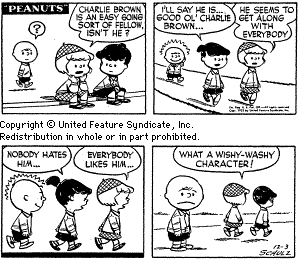Munich: Spielberg goes wishy-washy
The 1972 Olympic games were held in Munich, in what was then West Germany. One night, eight Palestinian terrorists gained entry into the Olympic Village. They killed two members of the Israeli team, held nine other Israelis hostage, and subsequently killed them when the German government carried out a failed rescue attempt.
The new Steven Spielberg movie takes its title from those shocking events. Spielberg reenacts the events, very effectively, in the film's opening scenes. But this is just a prelude to the story Spielberg really wants to tell.
The movie is actually about Munich's aftermath: the decision of the Israeli government to locate and assassinate the leaders of the massacre, the Osama bin Laden and Ayman Al Zawahiri of that era. According to palestinefacts.org:
- Following the Munich massacre, Israeli Prime Minister Golda Meir gave instructions for Israeli agents to hunt down and kill those behind it. She told the Knesset on September 12, 1972:
- We have no choice but to strike at the terrorist organizations wherever we can reach them. That is our obligation to ourselves and to peace. We shall fullfil that obligation undauntedly.
To carry out the Prime Minister's directive, the Israeli Mossad [secret service agency] initiated one of the most ambitious covert counterterrorist campaigns in history. …
One [assassination team] operated through normal Mossad channels while a second unit recruited staff officers and highly trained specialists anonymously and external to the government, supported financially through covert mechanisms.
 The movie purports to tell the story of the second, irregular team. That team assassinated five of the leaders who were responsible for the Munich massacre and participated in killing three more. They also eliminated four other terrorists not involved in Munich, but associated with other crimes against Israel.
The movie purports to tell the story of the second, irregular team. That team assassinated five of the leaders who were responsible for the Munich massacre and participated in killing three more. They also eliminated four other terrorists not involved in Munich, but associated with other crimes against Israel.Rating the movie merely as entertainment, I would give it only 3 stars out of 5. Spielberg is a great storyteller, and he has the raw material of a great story here. But the movie is flawed: for example, there are two contrived conversations between Avner, the leader of the Israeli team, and his Palestinian counterparts.
More seriously, there is a scene toward the end of the movie that intermingles sex and violence in a way that is simply bizarre. (The violence in the movie is graphic by my standards, but then I have a low tolerance for blood and gore.) I might say the scene is exploitative except it isn't the least bit sexy. Presumably it's supposed to contribute something to character or plot development, but I have no idea what the scene's message is.
But those are my comments on the movie as a movie. Munich has another, philosophical level to it — and it is flawed at that level, too.
Spielberg doesn't want just to entertain you; he wants to change the world. In an interview with Time magazine, he described Munich as a "prayer for peace".
Munich sets out to convince you that killing people is immoral, and that one violent act leads to another. There are two problems with that objective. First, I expect you already know that one killing leads to another in a vicious circle. Second, Spielberg couldn't risk offending anybody, so he fails to take a moral stand of his own.
Spielberg hoped that both the Palestinians and the Jews would enthusiastically embrace this movie. Instead, he has offended both groups. That is always the result when you try to please everyone: instead, you get dismissed as "wishy-washy".

But perhaps "wishy-washy" isn't strong enough language. Spielberg has been accused of glossing over the evils of terrorism: of trying to establish moral equivalence between the Jews and the Palestinians.
The movie is based on a book, Vengeance, written twenty years ago by George Jonas. In Macleans, a Canadian periodical, Jonas comments:
- Spielberg's Munich follows the letter of my book closely enough. The spirit is almost the opposite. Vengeance holds there is a difference between terrorism and counter-terrorism; Munich suggests there isn't. The book has no trouble telling an act of war from a war crime; the film finds it difficult. Spielberg's movie worries about the moral trap of resisting terror; my book worries about the moral trap of not resisting it.
I tend to agree with Jonas. There is a valid moral distinction to be made here. The Palestinian terrorists set out to kill civilians, guilty of nothing (unless it is a crime to be Jewish). The Israeli assassins, on the other hand, set out to kill enemy combattants: men with innocent blood on their hands.
Philosophically, that's where the movie goes awry: Spielberg fails to make that valid moral distinction.
That said, Spielberg does take a stand of a different sort. Munich tries to persuade us that Israel's strategy of targetted assassinations is futile. In fact, Spielberg is appealing to both sides, the Palestinians and the Jews. His message is, you can't end violent acts by committing other violent acts. Violence is futile; opt for peace instead.
I agree with Spielberg, and I bet you do, too. Peace is better than war, love is better than hate, we're all human regardless of ethnicity and culture: why can't we all just learn to get along?
Let's hope the terrorists and assassins turn out to this movie in droves, and world peace breaks out.
Call me cynical, but I doubt it will happen. I'm going to give the last word to Jonas:
- With due respect to pop culture and its undisputed master [i.e., Spielberg], one doesn't reach the moral high ground by being neutral between good and evil. Spielberg is a fabulous entertainer, a magician of a director, a very astute businessman — maybe, just maybe, it's too much to ask that he should be a significant moral philosopher as well.
He brings to the screen an adolescent's fresh eye: that's his strength. He also brings an adolescent's naïve confusion: that's his weakness.
copyright © 2006, Stephen Peltz


3 Comments:
Spielberg really disappointed me with this one.
Q, very thoughtful post. I haven't seen the movie, but my father sent me something that has much in common with what you've written:
http://www.jewishjournal.com/home/preview.php?id=15152
Spielberg has apparently been spending too much time with shallow sycophants. Their lack of moral character and wishy-washy philosophical leanings seem to have rubbed off on him.
The contrast between Spielberg and the other talented entertainment genious highlighted in Q's post couldn't be more obvious! George Schulz sure understood that you can't please everybody. Why is Steven Spielberg being given a pass on his failure to understand this? Next he'll want to do a full-length treatment of The Rodney King Story!
Post a Comment
<< Home